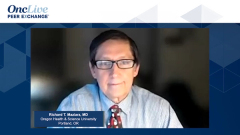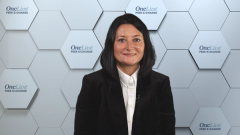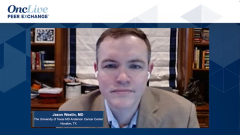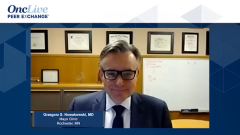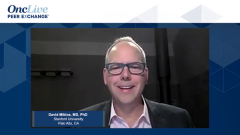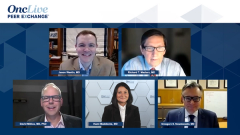
Concluding Thoughts on the DLBCL Treatment Landscape
DLBCL experts share their thoughts on the changing treatment landscape and emerging treatments in large B-cell lymphomas.
Episodes in this series

Transcript:
Kami Maddocks, MD: I’d like to thank you all for this rich and informative discussion. Before we conclude, I’ll give you each time to offer concluding remarks about the discussion today, the next most exciting thing in large cell lymphoma, or anything you want to hit home.
Grzegorz S. Nowakowski, MD: Thank you, Dr Maddocks. An approach that we didn’t discuss extensively today are bispecific antibodies. The revolution of bispecific antibodies is very interesting, because in addition to working through the immune system in a similar fashion to CAR [chimeric antigen receptor] T cells, this platform also allows for combinations of new agents. We have already seen at the beginning of the presentations at this year’s 2021 ASH (American Society of Hematology Annual Meeting), the addition of other agents to bispecifics. We’ll see more of this being developed in the future. With this approach, we’ll see higher response rates and better durability of responses compared with what’s already a pretty high bar with bispecific antibodies.
The only other point I’ll make is that I’ll give kudos to Dr Westin. Years ago, he was proposing chemotherapy-free approaches in front-line therapy of diffuse large B-cell lymphoma (DLBCL). At that time, this was heretical, and all of us had a fast heartbeat just listening to him talk about it. It’s very rewarding to see that the mindset is changing. There’s an ongoing discussion of chemotherapy-free approaches in frontline large cell lymphoma, and how we can select the right population, how we can design those studies, and how we can slowly go away from R-CHOP (rituximab, cyclophosphamide, doxorubicin, vincristine, prednisone) therapy. That’s exciting to see, because ultimately, replacing this fairly antique therapy would be a goal if we can achieve it.
Jason Westin, MD: Thank you, Greg. It’s very gratifying to see these novel approaches begin to bear fruit, and the idea of adding our amazing new targeted therapies to 1970s chemotherapy. I’m hopeful that we can start having novel-novel combinations in the front line that are gaining traction. I’m quite intrigued by the potential for moving CAR T cells to even earlier lines. The ZUMA-12 data presented at this meeting is intriguing, but we’ll need a randomized study in that high-risk patient population in the front line to show whether CAR T-cell therapy is potentially better than chemotherapy for patients who don’t do well with chemotherapy.
Richard T. Maziarz, MD: I’ll echo that these are great results. I believe the standard of care has changed for the patients with early relapse after primary therapy. The field is continuing to evolve. I’d be remiss in my role of chair of the Value & Health Economics Interest Group of ASTCT [American Society for Transplantation and Cellular Therapy] not to say that these are expensive therapies. And also, we’re only at the entry level. We’re in kindergarten when it looks to where cell therapy is going to be. We’re not in college yet. We’re not in graduate school yet. There are so many products and new therapies in development. Competition should bring cost down.
One of the things that we also have to always be aware of is access. Our patients need access. It isn’t just patients in the United States, it’s patients everywhere. I have a colleague in Mexico in the transplant space who’s on our committee. Every month, he asks us, "What are we going to do to bring CAR T to Mexico? What are we going to do to bring CAR T to other places in the world so that patients everywhere can reap the benefit?" In the comments, we heard about Nex-T, the new next-generation, where it’s going to be shorter manufacture. If shorter manufacture is successful, the cost of goods in manufacture should fall. And if the cost of goods in manufacture fall, the expenses should fall. That should also hopefully lead to lower expenditure, lower cost, and the ability to deliver more product to more people everywhere. That would be my final comment.
David Miklos, MD, PhD: I applaud your comments there, Rich. We’ve advanced CAR T-cell therapy and therapy for lymphoma with targeted therapies tremendously over the last 5 years. Congratulations to the community. But patients need more, because what I’m focused on is that it’s only a 37% five-year survival. We always die of what we study, so I’m concerned that we need to improve this therapy tremendously. We’re on a good start, and it’s still kindergarten, as Rich said.
I focus on 2 ideas here. Rich, you talked a lot about the importance of competition for cost reduction. I’d talk about competition for innovation, because as I said at the beginning, all 3 binders are exactly the same. They’re remarkably the same. The production is remarkably the same. Why is it all the same? The ability to push things forward will probably come in academics and through expensive laboratories. Rich, I’m sorry to say that GMP (good manufacturing practice) production is challenging and expensive.
Also, there’s a preferred T cell out there, and we need to identify it. It's not a heterogeneous collection of everybody’s peripheral blood mononuclear cells going into the best CAR T. The analysis at the single-cell level is an exciting scientific question, and it’s going to have an impact as we identify the better vehicle to make the CAR out of. Secondly, we already recognize that we need to move to multitargeted missiles; that the CAR needs to move from 1 antigen, which is an Achilles heel for antigen escape, to multitargets. In the next 2 to 3 years, those are the 2 things that I look toward to.
Kami Maddocks, MD: It’s definitely an exciting time. Thank you all again, and thank you to our viewing audience. We hope you found this OncLive® Peer Exchange discussion to be useful and informative.
Transcript edited for clarity.


